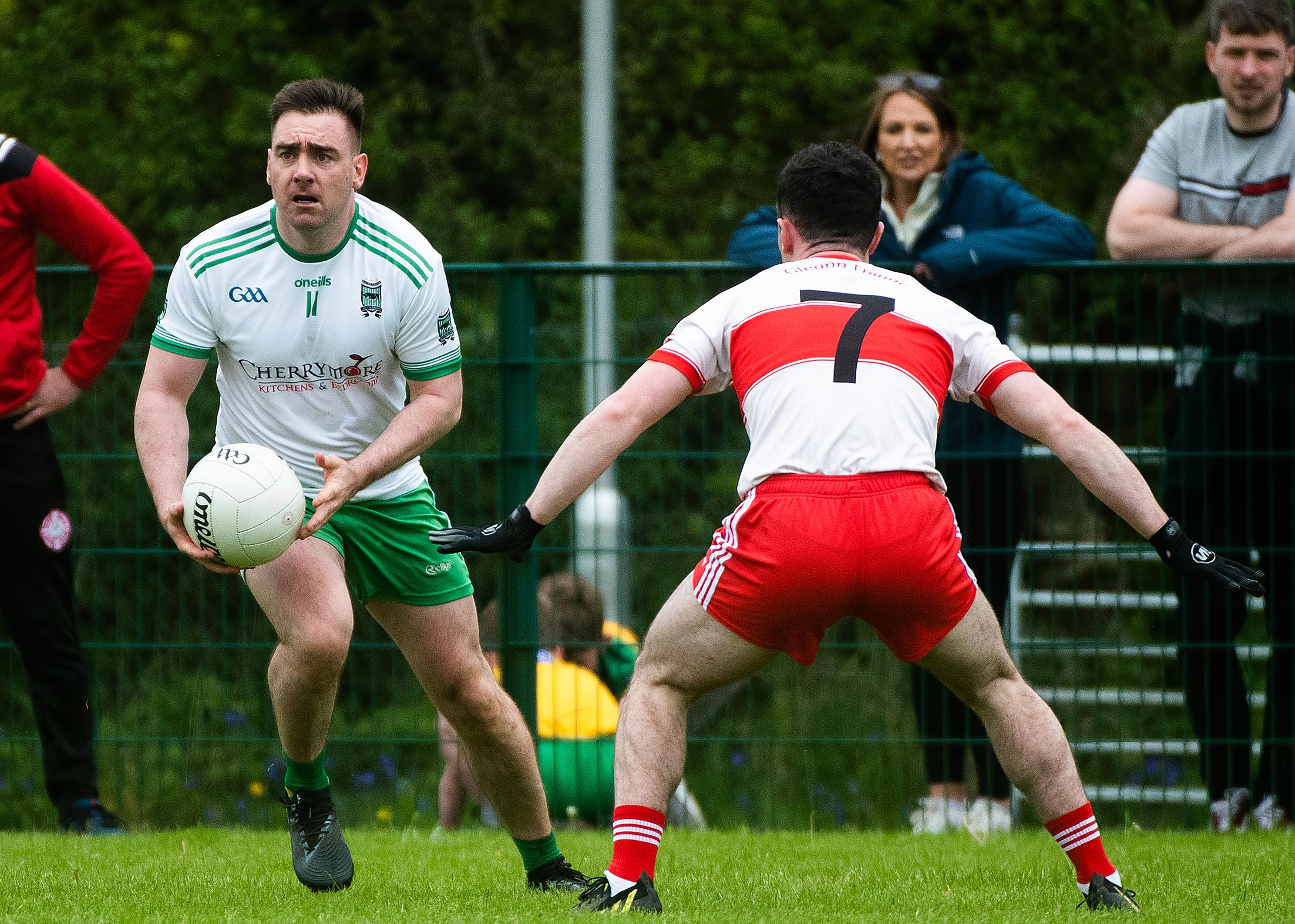The club season has kicked into gear. Michael McMullan spoke to three senior club players about their early thoughts on the new rules…
Peter Stuart (Bellaghy)
FOOTBALL began outfield for Peter Stuart. In recent years, he has been the regular Bellaghy number one.
When the Tones’ season began earlier this year, he was excited. A man made to offer an attacking option in the 12v11. Then came the FRC’s tweak. If a goalkeeper wants to come out, a team must pay a man back from the middle eight.
“I played one game with them and I ended up picking the ball up on the far 13-metre line and taking a shot,” Stuart said of the early season.
“The most recent game I’ve played, I have not left my six-yard box. It’s completely changed with the amendment and it’s odd to get used to.”
Stuart, who is now involved in coaching the Derry u-16 goalkeepers, has changed his focus. He is a student of goalkeeping with a rebranded bread and butter. Fielding high balls and saving shots.
“What got me interested in goalkeeping in the first place was the kick-outs because that was my strength. Now, I feel, I’m just hoofing the ball.”
Kick-out retention is still paramount. Stuart used to target 80 per cent plus with a mixture of short and mid-range restarts. Now, it’s totally different. However, the risk isn’t worth it. The space isn’t there and he can’t bail out a squeezed defender by taking the ball back. Breaking ball is the new currency.
He’s not a fan of the arc. It might have fans excited watching a scramble for possession but Stuart is a player. End of.
“The mid-range kick-out is not worth trying,” he said. “You were able to get lower-level kickers into goals maybe a year or two ago because they could do that really short, nippy kick-out.”
He likes how a goalkeeper with a varied kick can add to the game, but the shortcoming is the packed middle third. For now, he is focussed on the breaking ball. Maybe variations will evolve.
Stuart believes the fundamentals of goalkeeping were “glossed over” with outfield players coming in without knowing the goalkeeper ready position or closing down angles on shots. The essentials.
“We didn’t actually face that many shots,” Stuart said. “Now you’re going to be facing your one-on-ones, you’re going to have to control your area, communicate to your defence.
“You’re going to have to use whatever tools you have as a goalkeeper because you’ll be tested down the road.”
With the basics, a goalkeeper will be exposed. That’s why Stuart is indebted to former Bellaghy ‘keeper Kevin O’Neill who has been coaching him from day dot in his new goalkeeping journey.
“He’s a massive, massive stickler for the very basics of goalkeeping,” he said of O’Neill’s input. “We do it every single day we’re training.
“A year before I actually started, I had him giving me one-to-one sessions. I’ve had a lot of time with him.”
If he was on the FRC, Stuart would contemplate bringing the goalkeeper back into the game. He accepts it goes against what he said about the new goalkeeper basics. He doesn’t envy Jim Gavin and his committee.
“I’m so throttled standing on that six-yard box, watching our defenders try and make it out. I’d love to be able to go and contribute to the play,” he said, before offering a final work on the kick-out arc.
“If you bring the shorter kick-out back, I was never a big fan of the kick-out around the ‘D’, but it opened up the options for the mid-range kick-out, which I like. You pick your poison because you’ll never please everyone.”
Oisín Devlin (Ardboe)
OVER a decade at club level is a lot of games. Devlin is seeing a more open game now. Even more at club level where there are more experimental teams versus county teams having their house in order. There is a higher fitness level but it’s more than that. Counties are in the nitty gritty and defensive setups are bedded in.
He welcomes change. It’s not about keeping the ball any more. He references Kerry and their tendency to kick. A mindset.
“At club level, you can definitely see the difference, that there’s some players that are really, really open to go for that,” he said.
Shay McGuigan will lift the head and look for a kick. Younger players are more tuned into safety first.
“I really like the rules, for that one-on-one,” Devlin said, comparing it against game-plans bordering on lazy. Bodies back. Cover. Shuffle. Close off the space. Now, the game is faster.
“It also takes a lot more brain power really because there’s so much space,” he said, having played a host of games in the Ulster League and the Jim Devlin Cup.
“Especially as a defender, it’s about trying to work your angles, where you’re trying to cut off space, but also to mark a man.”
Dangerous forwards will need an element of cover from a second player but everyone’s number one focus is their own man.
“Now, you have to really be thinking a lot more about your positioning,” Devlin adds. “It’s definitely more exciting and I enjoy it a lot more.”
From watching the game over his career, Devlin recalls how the defensive tactics evolved. First it was a defender sitting deeper to cover. It developed into a dedicated sweeper. The multiple sweepers until it morphed into getting everyone behind the ball.
“There was always an element of, probably, fear of conceding more than it was about going out and playing football, of a more forward-thinking setup,” Devlin summed up of the change.
“The art of defending, probably went out of the window a wee bit because all you were doing was shepherding men, waiting for men to come over, instead of actually just tackling them.”
Now it’s different, it’s 11 versus 11, and everybody is paddling their own canoe.
It was the same for the attacker. They now have an avenue to take a defender on. Men like Devlin. He is also open to the other aspect of the defender’s game. The source of every attack. The fist pass only takes a team so far. A kick from wing back to wing forward gets the game moving.
He uses the example of Armagh versus Kerry in Tralee earlier this year and the Kingdom’s penalty. A packed side, a switch of the play and Micheál Burns storming into space.
“We should be looking ahead, trying to get the ball, as far as possible, because that’s, now your first point of attack, it’s essentially from your defence. You can get the ball out and the better an attack you’re going to have.”
On the defensive side of being a defender, Devlin can also see the importance in how referees police the four steps rule. In a world of one on one, defenders count the steps before taking aim with their tackle.
“If the man evades you and obviously, takes a couple extra steps, then, it’s very, very hard to defend,” he points out.
Another aspect it tuning in on how teams use their three inside forwards. Devlin references a game with Derry side Ballinascreen where their inside forward Noel Rafferty didn’t play as a conventional inside role. He played close to the 45-metre line.
Every team is different. In their game with Ballymena, they had to deal with former Antrim player Paddy McAleer playing as an inside forward.
“It takes communication (on the field) and research from the management,” Devlin said of how teams will deal with variation as the season thickens up.
“A lot of it will come down, again, to football IQ and spatial awareness and cutting out the space.”
In many quarters, keeping a compulsory three players in each half is the game changer. The question is club level and how officials deal with it when rocking up on their own to take charge of a club game.
Devlin points to leading referee Sean Hurson delivering a talk on the rules and how the Galbally man spoke of relying on the players to call it out.
“At the end of the day, referees don’t have four eyes,” Devlin said. “They can’t pick up behind them so their sole focus is going to be on the players. He (the referee) gets a bit of a prompt really.”
Marty O’Reilly (Seán MacCumhaills)
THE new rules were needed. Marty O’Reilly speaks of the last proper, enjoyable, “free for all” football being in QUB.
“I think a lot of people were actually being put off football, even club players,” said the Donegal All-Ireland winner.
“When young players were playing college football or U-21s, it was more kind of a laissez faire style.”
Then it changed. O’Reilly, who is playing up front for MacCumhaills, compares it to a horse riding not to lose rather than riding to win. The rule enhancements were a must. Enjoyment has infused back in again.
“I think the game’s faster. There’s no chatting whatsoever to the referee, which is a positive,” O’Reilly said.
“There’s less off the ball skirmishes because you don’t actually have time for any of that nonsense now. Someone’s tapping and going and the ball’s gone again.”
MacCumhaills were seven points up in their league opener against Termon. With a quarter of the game to play, in the old game, they’d have been home and hosed.
“Within 10 minutes, we were seven points down, so it was like a 14-point swing,” O’Reilly said.
There is more space now. He jokes about having lost a yard of pace but there is more room to operate in.
Playing as part of a front three, two forwards tend to stay up “95 per cent” of the time. The other will drop into the middle third if needs be. A tired transitional player who has chased forward can swap inside.
O’Reilly used the example of Caolan McGonagle and Michael Murphy interchanging in Sunday’s win over Derry.
“They obviously communicated,” he said. “We’ve been caught out twice already for not having three men up and it’s a severe punishment (20-metre free).”
Like Oisín Devlin found on Ardboe duty, O’Reilly has noticed referees listening for a shout on any “three up” infractions off the ball before looking around for a quick count. The relaxation tweak of a player four metres over the halfway line, not interfering with play, has left some room for a genuine error.
“They’re only learning too,” he said of referees. “If there’s a genuine attempt, you know yourself, a referee will want to know if there’s a genuine attempt to get back across the line.”
As an inside forward, aside from the communication needed to ensure they’ve always three up, O’Reilly outlines that he is largely unaffected by the rule changes.
The one he has a concern about is the need to hand the ball to the nearest opponent after conceding a free in possession.
While stressing it had no influence on their defeat to Termon, he points to one if their players surrounded so tightly there was no physical room to hand the ball back after overcarrying the ball.
“He wasn’t in a position to release the ball,” he recalls of the incident and the ball was moved forward.
“It didn’t affect the game but if you happen to be a point down in the last minute, if you just smother a player, he can’t release the ball.
“If a referee moves the ball forward 50 metres, it could be taken out for a two-pointer and you can win the game.”
O’Reilly’s feels dropping the ball is adequate with officials also needing to judge whether the player can actually do so.
“You see players getting ultra-cautious because the penalty’s so severe,” he adds. “They’re nearly running back and putting it in their lap.”
Generally, O’Reilly is happy with how it has all unfolded but admits he’d have been happy enough to have left the goalkeeper going into the other half of the field as it was.
If a team had the tools to make hay from the 12 versus 11, so be it. In his eyes, teams with a goalkeeper who can add to the play should be able to do so without needing to drop someone back in their place.
Why? It’s just another entertaining dynamic to the game. He uses the example of Ciaráin Murtagh’s goal against Down in the league. The vision to see empty net and having the instinct to find the net.
Peter Stuart has new goalkeeping targets. Oisín Devlin will focus on angles and limiting space. For O’Reilly, his game as an inside forward is about the one-on-one battle. He loves how refreshing it is.
“2011 was my first year and we used to play two up at that stage,” he said. “The last five or six years, you were amongst six or seven lads in front and it was really hard to get space.”
Now the reward is there for attacking instinct. He mentions former Donegal teammate Dermot ‘Brick’ Molloy’s key role in a youthful Naomh Conaill team in their league win over Buncrana.
“I think the wee bit of extra space will suit the likes of himself too,” O’Reilly said.
“When the space opens out, different players might begin to flourish again.”
There is one general concern when casting a final eye over what the FRC have laid out. A referee’s interpretation. He accepts it can be different and, indeed, people can make mistakes.
With a 50-metre penalty, a wind and the chance of a two-point free winning a crunch game, referees will be under the spotlight.
“I just feel there’s going to be a massive amount of pressure on referees to make the right decisions,” he concludes.
“If they do go with something that maybe they get wrong, realistically it could be a two-point swing or a four-point swing.
“Obviously there has to be total respect for referees and that’s where it’s coming from. There’s definitely much more respect from what I’ve seen in the game so far. There definitely is.”
Receive quality journalism wherever you are, on any device. Keep up to date from the comfort of your own home with a digital subscription.
Any time | Any place | Anywhere















